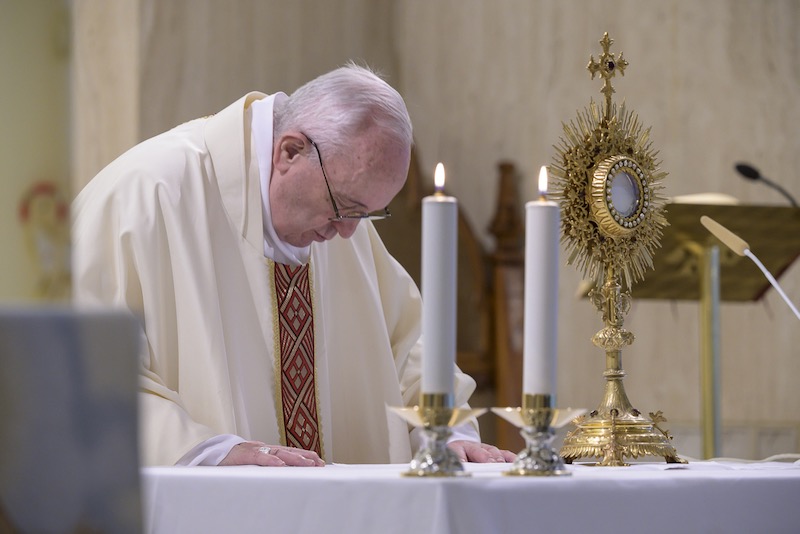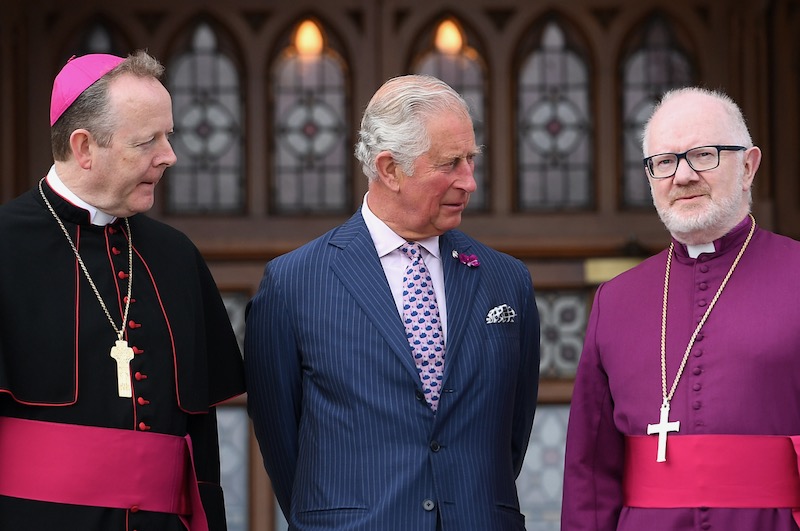The head of the Irish Church has appealed to political leaders in Northern Ireland to allow churches to reopen, even if only for solitary prayer.
In an interview with journalist Eamon Mallie, Archbishop Eamon Martin said the Church is “walking” with people during the coronavirus crisis and he urged the authorities to permit moments of individual prayer in churches or the lighting of a “candle of hope in the midst of this darkness”.
“We have had to close the doors of our churches in Northern Ireland much to my annoyance because I really think it is saying something when you close the door of God’s house,” Archbishop Martin said.
He said a spiritual dimension was hugely needed at the moment and the Church was reaching out to people as best it could through electronic means.
“I think all of the churches are reaching out to give people the consolation of faith and the comfort of God’s presence during this time.
“We are getting fantastic feedback from people saying give us more of this. It is beautiful when our internet providers tell us that tens of thousands of people are tuning in for our Sunday Masses, our services, our Holy Hours and our inspirational talks.”
But the Archbishop admitted that for him as a priest and a bishop it is a very difficult time.
“I do struggle like many other people to cope with the big massive upheaval in our lives that we are facing at this time. I miss my congregation. I think a lot of priests are feeling the same sort of struggles that many of our people are feeling at this time. The virus has turned our whole lives upside down in a matter of weeks, it has just completely changed our lives.
"It has forced us all to stay apart and it has prevented us from doing a lot of the things we love to do as priests and as bishops – to walk with our people, to accompany them in the happy days and in the sad days of their lives. It has destroyed our opportunity to gather our people – the church is about gathering. Ecclesia: the whole meaning of church is about gathering people together.
“We are doing well to gather people virtually and we are making the most of social media to stay in contact but it is not the same as seeing your people gathered at the weekends or to go out into their homes and be with them when they are sick or to celebrate with their children when they are having first communions or baptisms or weddings. We miss that personal human contact – it is only natural.”
On funeral restrictions, Archbishop Martin lamented how “sacred moments” have been “so cruelly interrupted”. He added that it had been “really awful” not to be able to be with people when they are dying and to walk with the bereaved in their dark days.
“I find it most disconcerting that people who have suffered the death of a loved one are not able to grieve in a way that we have become accustomed – that we are not able to embrace, to hug each other, to be with each other, to hold each other’s hands when they are dying.
"When you cut us off from the things that we naturally and humanly do to show compassion, love and care for each other, I think that really rattles us inside. I do believe that people are crying out even as Jesus did on the cross - why are you abandoning us Lord.
“A few people have described the experience we are going through as a kind of imposed monasticism, where everyone is indoors and secluded like monks. But there is a big difference between monasticism which is freely chosen and being told you have to stay in.”
Questioned as to whether he believed the coronavirus pandemic would lead to a resurgence in prayer and faith, the Primate of All Ireland said he thought the crisis was leading to a moment of conversion in a lot of people’s lives.
“I think it is making people reflect on their relationship with God, with nature, with each other, with the poor and with those who are less fortunate. In that sense this is a religious experience for all of us.
“I do feel that this will draw more people back to God, it may bring more people back to their faith, the Church and to the sacraments – I hope it does.”
However, he dismissed the idea that the Coronavirus is a punishment from God for ungodly behaviour.
“I don’t actually think that this is a scourge of God or God’s retribution for the terrible sins of mankind. I don’t subscribe to that although I do feel that it is a natural enough question that can emerge out of our sense of confusion.”
He said the crisis is throwing up big questions for people to grapple with and is calling them on a journey inwards. “We are being asked big cultural questions, ethical questions, big questions about economics and about the way we organise ourselves. A lot of people are searching through this experience to try to find meaning in their lives and questioning the things that they do every day. I know that I certainly am doing that.”
He also suggested that nature is forcing people to recalibrate their sense of who they are in terms of the planet and to recognise that they are not omnipotent, as well as demanding that the disproportionate impact climate change on the world’s poor is addressed – something which the climate justice movement and Pope Francis have been highlighting for years.
“Are we aware of the fact that cholera and malaria and even measles devastate massive populations of our world every year – we don’t even notice. We are noticing this one because it is impacting the Western world. Goodness knows the impact it is going to have on some of the developing nations. What is going to happen in countries where people don’t have access to clean water? How can you give the message of washing your hands often to people who don’t have access to clean water? How can you tell people they must self-isolate when they are living on top of each other in makeshift shelters?”



 Loading ...
Loading ...